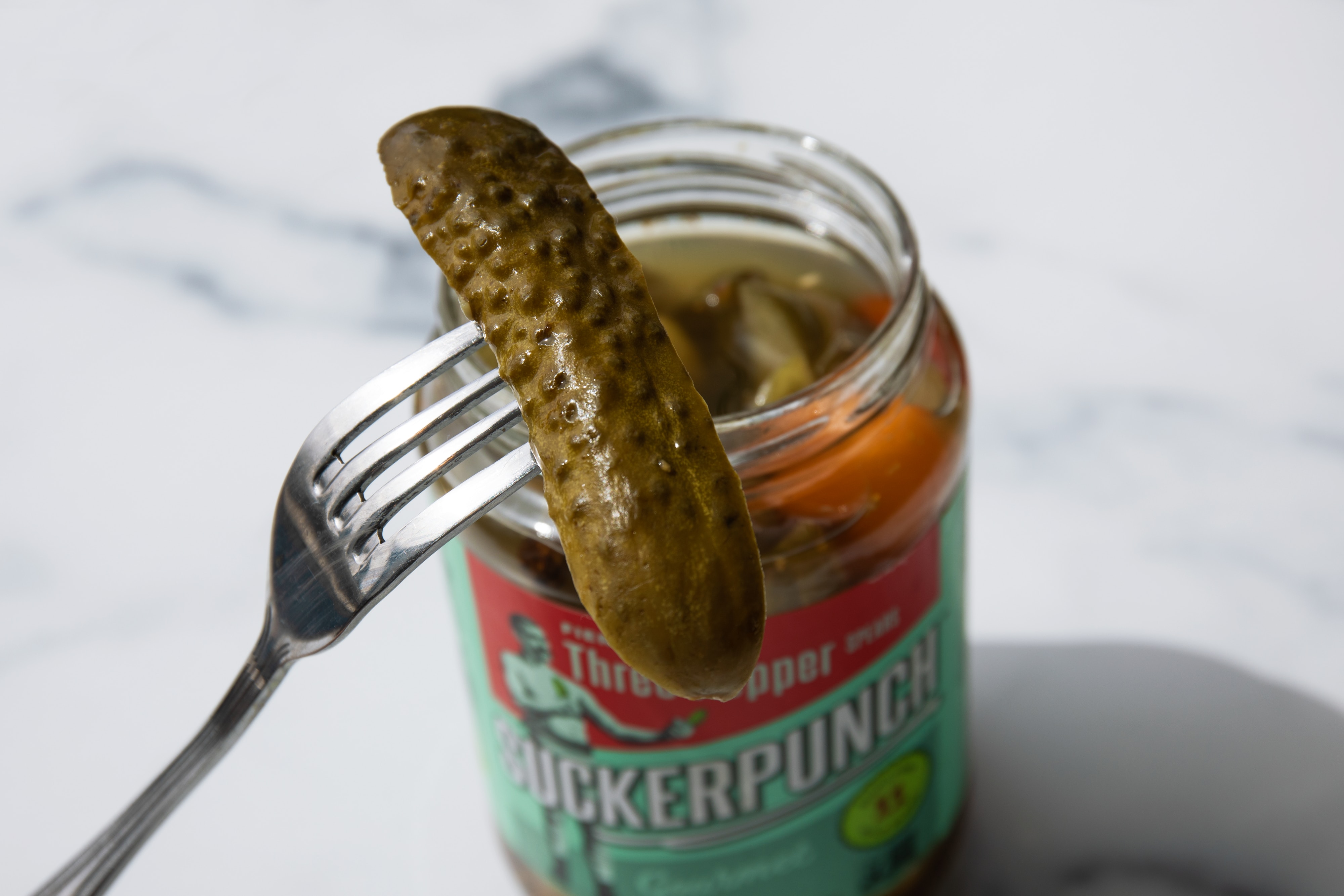Have you ever seen your dog looking at the pickles on your plate and wondered if it’s okay to share? Pickles – a staple in many households are often a subject of curiosity for dog owners. Can dogs eat pickles without any health risks, or should this crunchy treat be kept exclusively for human consumption? You’re not alone in this curiosity, and the answer might surprise you.
- Pickles can be risky for dogs due to high sodium and harmful spices.
- Feeding dogs pickles can lead to salt toxicity and potential anemia.
- Dogs with kidney issues should avoid vinegar and salt in pickles.
- Xylitol in sugar-free pickles can cause liver failure and death in dogs.
- Even non-toxic pickles pose choking hazards and intestinal blockages.
Pickles, while not inherently toxic, can be risky for dogs due to high sodium content, harmful spices, and contents like garlic, xylitol, and onion. And, these can cause salt toxicity, anemia, kidney stress, digestive & heart problems, liver damage, diabetes, and other health issues – making them unfit for canine diets.
Stick around as we delve deeper into the specifics of why pickles might not be the best snack for your dog. And, we’ll go into the ingredients and health risks to help you know more about what’s good for your dog to eat.
The information provided herein is for informational purposes only. Please refer to our disclaimer for more details..
What Are Pickles Made With?
Pickles are a popular condiment made by soaking cucumbers in a brine composed of vinegar, salt & a variety of spices like dill, coriander seeds, and peppercorns. This process, known as pickling, not only preserves the cucumbers but also imparts a unique flavor profile, combining sweetness, saltiness, and crunch. Interestingly – other veggies like beets, cauliflower, and carrots can be pickled too. Pickling uses a lot of salt, which makes pickles very salty. And dog owners should think about this when deciding if pickles are okay for their pets to eat.
Are Pickles Safe for Dogs To Eat?
When thinking about giving dogs pickles, it’s essential to understand the pros and cons. Pickles aren’t poisonous to dogs and might help their digestion because of the beneficial bacteria that form during fermentation. But, they’re not the best snack for them. The main problem is how much salt pickles have – which comes from the brine used to pickle them and too much salt can cause health issues in dogs, like high blood pressure or heart problems. However, a dog would need to eat a lot of pickles for these problems to happen. Also, some pickles contain extra ingredients that are bad for dogs. These include:
- Garlic
- Onion
- Nutmeg
- Spicy peppers
- And xylitol, a sweetener & preservative.
Because of this, most veterinarians do not recommend giving dogs spiced pickles. If you do give your dog pickles, pick plain ones without extra seasoning. And give them only a little. Make sure they drink plenty of water too, as the salt can make your dog thirsty.
Bottom Line: A small piece of plain pickle once in a while might not hurt your dog, but it’s usually better not to give them as a snack. If your dog accidentally consumes a large amount of pickles, particularly those with harmful additives, is potentially lethal for your dog.
Various Types of Pickles
Pickles have diverse flavors, with varying levels of spiciness, and can potentially include harmful ingredients for dogs. Due to the absence of a consistent recipe, you should check what’s in them before giving any to your dog.
1. Dill Pickles
These pickles are cucumbers put in brine and dill. Dill is okay for dogs and has antioxidants. But, the salty water and vinegar in these pickles can be harmful. So if you want to give your dog the benefits of dill, try adding fresh dill to their food instead.
2. Bread-and-Butter Pickles
These sweeter pickles have cucumbers, salty water, peppers, sugar, onions, garlic, and seasoning. And, ingredients like garlic and onions can damage a dog’s red blood cells – which can lead to anemia. Even though there’s not a lot of them in these pickles, it’s safer to not give them to your dog.
3. Hot-and-Spicy Pickles
Known for their extra spiciness, they’re made with cucumbers, salty water, chili pepper, and other hot spices. These can upset a dog’s stomach, causing problems like gastrointestinal upset or diarrhea. So they’re not good for dogs, especially those with sensitive stomachs.
Health Problems Linked With Feeding Your Dog Pickles
Before you give your dog pickles, it’s important to understand the health problems they might cause.
1. Salt Toxicity
A big worry with pickles is how much salt they have. A medium pickle can have between 700-1,500 milligrams of sodium – which is way more than what dogs should have. The Association of American Feed Control Officials (AAFCO) says dog food should have at least 0.3% sodium for health. Excessive sodium intake from sources like pickles can be detrimental and can cause dehydration, as it triggers fluid released from muscles and tissues. And for dogs with Addison’s disease, who struggle to regulate fluids and electrolytes, this can lead to salt poisoning. Signs of too much salt include stiffness, trouble walking, shaking, and seizures.
2. Long-Term Health Risks of Excessive Sodium
While sodium is essential for balancing fluids and assisting the nervous system, excessive long-term intake can lead to serious health issues. These include high blood pressure, stomach cancer, heart disease & brain issues. Dogs with kidney disease can be badly affected by high amounts of sodium.
3. Kidney Stress and Vinegar
Vinegar, which is often used in pickles, offers no nutritional benefit to dogs. It can stress their kidneys and upset their stomachs, causing diarrhea. This is because it is acidic and can be tough on a dog’s stomach.
4. Anemia from Allium Vegetables
Pickles often have allium veggies like onions and garlic, which can be toxic to dogs. These veggies have a compound called N-propyl disulfide. It damages red blood cells (RBCs) and can cause hemolytic anemia. This compound sticks to hemoglobin, making damaged RBCs called Heinz bodies. And they die off quicker than new ones are made. Symptoms of anemia include extreme fatigue, loss of appetite, and potential kidney damage – requiring immediate veterinary care.
5. Sugar Content and Health Issues
Sweet pickles and bread-and-butter varieties contain significant sugar levels, ranging from 7-30 grams per pickle. Too much sugar isn’t good for dogs with diabetes, kidney problems, or who are overweight. And, it can also cause teeth problems like cavities and gum disease.
6. Gastrointestinal Upset from Spices
Some spices in pickles, like cloves, are usually okay in small amounts. But, spices like cinnamon and nutmeg have myristicin – which is bad in big quantities. Even a little can upset a dog’s stomach.
7. Xylitol Toxicity
Sugar-free pickles might seem like a safe alternative but have xylitol, an artificial sweetener. And it’s extremely dangerous for dogs. Even small amounts can cause liver failureand death.
8. Choking Hazard and Intestinal Blockages
Dogs sometimes don’t chew their food well. This can cause choking or blockages in their intestines. Pickles can be risky because of their size and texture.
Will Pickles Help a Dog’s Upset Stomach?
While pickles can be a tasty treat for humans, their benefits do not extend to dogs – especially when it comes to soothing an upset stomach. Pickles have a lot of salt and other ingredients that might be bad for dogs. And these can make a dog’s stomach problems worse, not better. Even though pickles have some vitamins and minerals, the negative aspects of pickles far outweigh any benefits for dogs with upset stomachs.
Is Pickle Juice Safe for Dogs?
No, It’s not safe for dogs, pickle juice is mostly salt, vinegar, and different seasonings. It’s used to give cucumbers flavor and preserve them. The high amount of salt in the juice poses different risks to dogs’ health. And most dogs don’t like to drink it because they don’t like sour or salty tastes.
Steps to Take If Dog Consumes Too Many Pickles
If your dog accidentally eats one or two pickles, there’s usually no immediate concern. However – it’s important to monitor them closely for any negative reactions within the next 24 to 48 hours. Watch out for symptoms like:
- Excessive urination
- Signs of dehydration (such as dry gums and heavy panting)
- Weakness
- Diarrhea
- Tremors or seizures.
- Vomiting
If you don’t know what kind of pickle or how much your dog has eaten, or if they show any of these symptoms, go to the vet right away. Take the jar of pickles with you. This helps the vet know what’s in the pickles. And tell the vet about any health problems your dog already has and how many pickles they ate, this info helps the vet understand how serious it is and what treatment to give.
To stop this from happening again, keep pickles where your dog can’t get them.
Conclusion
As a dog owner, you play a vital role in ensuring the well-being of your furry friend and being informed about what foods to avoid is part of that responsibility. Remember, your dog’s health and happiness depend on the choices you make for them. In our exploration of whether dogs can eat pickles, it is clear that your furry friend’s health is paramount. While pickles aren’t poisonous, their salt and things like garlic, onion & xylitol can pose serious health risks to your canine companion. So, next time you’re enjoying a pickle – think twice before sharing it with your pup. Overall they aren’t a good choice to feed your dog. Give them snacks that are safe and good for them instead.
Always put your dog’s health first and talk to a vet if you have questions about their new food. Let’s work together to keep our furry friends safe and happy.
179views
Share on Facebook
 Dark Mode
Dark Mode 

 No fees, cancel anytime
No fees, cancel anytime 







 Image credits:
Image credits:  Image credits:
Image credits: 










































-4
0